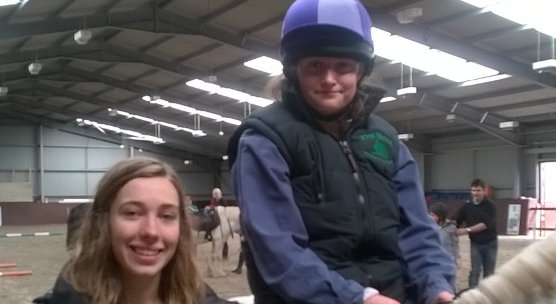Hippotherapy study looks to help children with cerebral palsy
Published On Mon 11 May 2015 by Roddy Isles

Can horse riding reduce the effects of spasticity in the limbs of children with cerebral palsy? A medical student at the University of Dundee has embarked on a research study with a local riding school to see whether patients can gain significant benefits from therapeutic horse riding, known as Hippotherapy.
Student Janie Giraudon has been working with the Brae Riding School in Dundee to see if there are any positive changes in pressure distribution in children with Cerebral Palsy during therapeutic horse riding.
Her research is examining whether muscle spasticity is reduced due to Hippotherapy. This involves measuring the seating pressure of the children before, during and after horse riding using a pressure sensitive mat placed on the saddle and wheelchair accordingly.
“It is already recognised that horse riding can bring significant therapeutic benefits for a rider,” said Janie. “The warmth and three-dimensional movement of the horse is transmitted through the rider’s body gradually making it more relaxed and supple, reducing spasms and improving balance, muscle-tone, co-ordination and posture.
“What I am trying to establish through this study is whether there are particular benefits for people with cerebral palsy. Ever since visiting the Brae a year ago with the Medical School, I have been very interested in the therapeutic benefits of working with horses.
“The early indications from our research are that there are benefits for the children but we are still in the process of collating the final data before we can absolutely confirm this. The findings of the research will hopefully benefit physiotherapists and as a result have a positive effect and even lead to a change in the view of Hippotherapy within the current NHS system.”
Gemma Lumsdaine (17), from Monifieth, has been taking part in the Hippotherapy sessions at The Brae. She said Janie’s research had confirmed to her the benefits of horse riding.
“I have always felt it was good to me but it has been great to see that confirmed and to see the extent to which it has an effect,” said Gemma. “It really helps my hips and my muscles. The only other way I could get that positive effect would be with medicine, so this is a great alternative.
“Coming here to The Brae and riding the horses has been great for me not just physically but there’s also a boost to my confidence.”
Janie has taken a year out from her medical studies to conduct this research, which is supervised by Dr Sheila Gibbs, Dr Graham Arnold and Professor Rami Abboud as part of an Intercalated BMSc honours in Applied Orthopaedic Technology in the Department of Orthopaedic & Trauma Surgery. She has been assisted with her data collection by Rehabilitation Technician Ian Gibbs at the University’s Institute of Motion Analysis and Research.
“The Brae have been fantastic in allowing us to conduct the research at their stables where they have been providing horse riding therapy for disabled adults and children since 2008,” said Janie.
Special posters and leaflets aimed at the children were distributed at the School and seven children, with the blessing of their parents, volunteered to take part in the study with data being collected at each of their riding sessions over a six-month period. The children are not required to do anything differently but just sit on their horse and enjoy their normal riding session which they always do.
Mary Sneddon, Centre Manager at the Brae, said, “We have thoroughly enjoyed working in partnership with Janie and Ian. This is a great opportunity to add to the evidence supporting the benefits of therapeutic riding and to help attract much needed funding. This is the first time we have had the opportunity to engage with external researchers since we opened seven years ago and it has been a positive experience for both parties.”
Professor Rami Abboud, Head of the Department of Orthopaedic & Trauma Surgery and Director of the Institute of Motion Analysis & Research (IMAR), said, “This is a very interesting and rewarding area of equestrian research to follow on from our previous study on horse riding and jockeys.
Janie’s enthusiasm, knowledge and skills in devising her own research project have enabled her, along with four of her fellow BMSc students, to have her research accepted for podium presentation at the 13th Staffordshire Conference on Clinical Biomechanics in Stoke-on-Trent, which takes place from April 23rd to 25th.
“This Hippotherapy study is continuing IMAR’s impressive research portfolio whilst interacting and hopefully benefitting the local community. It is thanks to centres such as the Brae that we can pursue novel avenues of research like this outside the confines of the laboratory, to try and transform the quality of life of patients in general. I hope this research has a positive effect on the understanding and wider use of therapeutic horse riding within the NHS, whilst continuing a better understanding of the mechanics and complexities of cerebral palsy.”
The Brae is a registered charity. For more information see:
www.facebook.com/TheBraeRdaDundee
Photo shows Janie Giraudon with Gemma Lumsdaine.
Roddy Isles
Head of Press
TEL: 01382 384910
MOBILE: 07800 581902
E-MAIL: r.isles@dundee.ac.uk